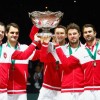by Andrew Eichenholz
Followers compare the Davis Cup to the World Cup of the tennis world. That is far from the truth, as Roger Federer and Stan Wawrinka have proven with both of their withdrawals from Switzerland’s upcoming tie against Belgium, and Federer’s decision to take the year off from the annual competition.
Keep this in mind: Switzerland was crowned as the top nation for men’s tennis just months ago. Now, with two of the best players on the planet out, the odds are heavily stacked against them to even get by a David Goffin-led Belgium squad.
In a sense, it is not much different than if Germany’s soccer team were to head to Russia for the 2018 World Cup without Thomas Muller and Manuel Neuer, possibly bowing out in the group stage.
That sounds silly because it simply will not happen.
World competitions in individual sports between every and all nations is meant to conjure a sense of national pride, not a fight to determine which country has the best athletes who feel like they have the time to show up.
This is not to blame tennis players. Compared to athletes who compete in other sports, tennis players do not have a break. Even their month-long “vacation” is full of anticipation and getting ready for the next year. It is not always easy to throw a way a week of time to risk fatigue or loss of form on a given court surface just to play for national honor.
Switzerland defeated Serbia, with Federer and Wawrinka in their native red to win their opening tie in 2014. The first thing that pops to mind is that they took down the man who was world No. 2 at the time, Novak Djokovic.
Wrong. Djokovic did not play, in need of rest ahead of a long season. The world missed out on a clash between three top-five stars.
That is why the Davis Cup needs to change, and do so quickly, while the sport is in its golden age.
If every player in the sport of tennis chose to partake in Davis Cup this season, there would be a fairly good chance that Switzerland would repeat as champions. Who would not want to see a Federer-Wawrinka against a Nadal-Ferrer led Spain in the final?
The wealth in tennis is spread around so much, that once nation never dominates for years on end. There is always a country that has extreme talent on the doubles court that sways a tie in one direction as well, giving them a chance for a major upset.
Then again, some of the sport’s best players do not even get a chance on the biggest stage, because the World Group only consists of 16 teams.
To give every nation a fair chance to truly enjoy the experience of world competition, why not make the annual tournament every three years, instead?
If the decision makers for the International Tennis Federation and the ATP World Tour were to find a major block of time, say a couple of weeks after the U.S. Open, therefore skipping the fall swing prior to the ATP World Tour Finals once every three years, why would players not get in on the action?
Much like January’s Hopman Cup uses a round robin style before culminating it all in a knock out round, why not find a format to expose some of the lesser-known countries a chance to show what they can do on the court, and make a spectacle for the world to see?
In Group II, the third tier of Davis Cup play, Bulgaria is scheduled to play Latvia. Both team’s stars, Grigor Dimitrov and Ernests Gulbis, respectively, are unlikely to play ahead of Indian Wells, one of the year’s biggest tournaments, just a week later.
Perhaps if that match came in a format highlighting all the teams rather than an elite few, fans would have a chance to see a matchup between a couple of the most talented athletes in the sport.
This annual competition will continue to find little attention and popularity if its best players are not involved. Forcing them to play Davis Cup three times in four years, when they may not even want to, does not enhance the attraction of the event.
John F. Kennedy once said, “Change is the law of life. And those who look only to the past or present are certain to miss the future.”
If the world wants to see exciting nation-based tennis competition in the future, success starts by getting together and thinking about it now.

